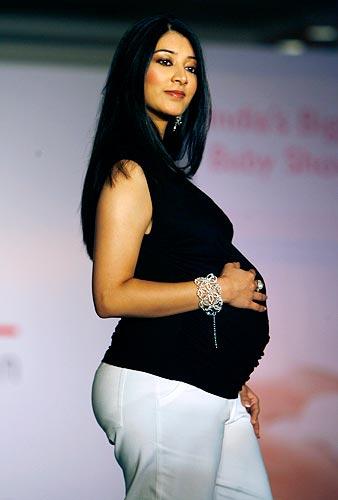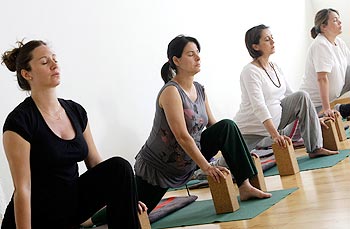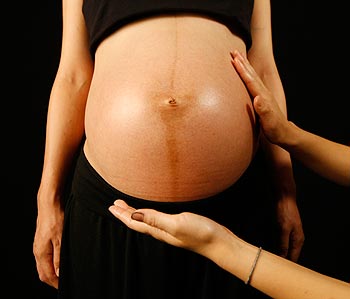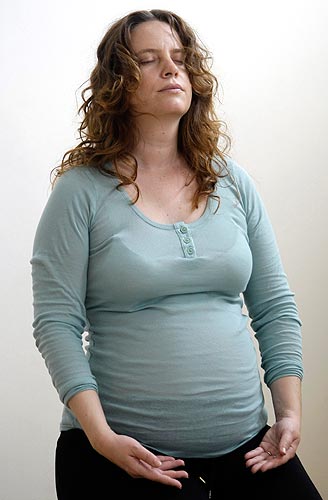 | « Back to article | Print this article |
Pregnant? Don't follow annoying, misleading advice
When a couple is expecting a child, it's a time of great joy and anticipation, but unfortunately, this is also a time when everyone around can't wait to get their two cents in and shower you with unwanted -- and sometimes misleading -- advice.
If it is your first pregnancy, you are more likely to be listening to all kinds of guidance from your family, friends, colleagues and even strangers -- yes, it's not unusual for people to walk up to you in the street and feel your tummy or give you their opinion. By all means, gather as much valuable information as you can, but beware of potentially unsafe advice. Here are a few annoying and potentially hazardous myths that you should guard against.
'Eat as much as you like beta, your food is supporting two people now'
"When I was pregnant, everyone around wanted to feed me, saying that I should be eating for two. I got so tired of their constant nagging, just the thought of food started making me ill," says 30-year-old Mumbai housewife Mansi Mehta.
Although you have a tiny baby growing inside of you and you do need some extra calories, pregnancy does not mean that your food intake should double or that you should overeat and gorge on whatever you have a mind to!
Eating for two will only make you gain weight, make you sick and do nothing for the wellbeing of the baby. The best way to figure out how much you need to eat is by listening to your body. You will find that you want to eat more often, rather than eat larger quantities at meal times. This is a very healthy diet plan, as long as you are picking the right foods.
'Don't exercise, it will adversely affect your baby'
You'll probably get this one from the older generation. But by not exercising, you make your body inactive, which in turn results in unnecessary weight gain, stiffness, swelling, aches and pains and to top it all off, a more difficult delivery.
"I was given strict instructions by my family to rest and not exercise at all throughout my pregnancy. To them, even minimal exertion to get the blood flowing was a risk,"says Meghna Jhaveri, 32, another Mumbai housewife.
Unless you have a sensitive pregnancy, exercise is a must but in moderation, which brings us to the next point...
Brinda Sapat is head of the Group Exercise Department at Gold's Gym, Napean Sea Road, Mumbai. Certified with Training Zone & Progressive Fitness (USA), she has been a fitness instructor for over a decade.
'Of course you must go gymming!'
This advice, at the other end of the spectrum, comes from the self-professed 'yummy mummies'. It is also the trend in some countries abroad. Over-exercising or performing high-intensity workouts like kick-boxing and weight-training are very risky. They can put undue pressure on the foetus and you can also get injured, which can affect your pregnancy indirectly.
Pick a light exercise like walking, easy resistance training exercises, stretching or yoga.
In fact, being an aerobics instructor myself, I was very keen on continuing my workouts, but fitness safety guidelines and my gynaecologist both advised me to opt for light, low-risk exercises like walking and attending a prenatal class.
'Eating ghee will help the baby slip out easily during delivery!'
You may be giggling at this ridiculous suggestion, but believe it or not, a lot of people actually go by it. If only it were that easy!
"Of all the crazy advice, this was the silliest -- 'consume ghee and your baby will just slip out,' I was told. But I managed to slip my baby out without it, thank you!" says Cheryl Arez, 32, who works as a personal assistant with a private firm in Dubai.
There is no connection between the digestive tract and the path of delivery. Ghee is only going to make you gain weight and increase your cholesterol levels. The birth canal has natural lubricants to do the needful.
'Avoid so-and-so foods when you're pregnant'
While healthy options do take precedence over junk food during pregnancy, do not listen to suggestions from all and sundry about what to eat or you'll quite simply end up eating nothing! Some say avoid sour foods, some say avoid almonds, other say avoid maida -- but unless your gynaecologist imposes dietary constraints on you, don't go by their counsel.
"Everyone around me had a list of foods I should eat and avoid when I was expecting, but I only went by what my doctor had to say," says Sonali Waghaskar, 33, a teacher from Nasik.
'Stretchmarks can be prevented by using creams and oils'
Stretchmarks are every mother-to-be's nightmare. And while you're using this cream and that oil to keep them at bay, the truth is that there is actually no way to prevent them. Stretchmarks are caused by a tear in the lower layers of the skin due to sudden weight-gain. It simply depends on the elasticity of your skin & there's nothing you can do.
"Fretting over stretchmarks when I was pregnant, I went by the advice of all my friends and bought creams and oils worth a fortune," says Mumbai-based designer Aditi Muni, 30. "But even after going to all that trouble, I still got them."
'Take complete rest in the last trimester'
Though the last trimester does bring on some fatigue, it is important to keep active and have the stamina to help deal with labour and delivery.
"My relatives advised me to stay in bed from the eighth month, but my doctor wanted me to continue with my walks and prenatal exercises," says Meghna Jhaveri. "Needless to say, I was caught up in the middle and being tugged in two opposite directions."
'Don't take any medicine'
That is true to an extent -- don't take any medicine without your doctor's permission. Some medicines are harmful if you're pregnant, but there are mild ones that are absolutely safe to take as long as you check with your gynaecologist first. It makes no sense to deal with a bad headache or injury when you have the option of taking safe medication.
"I refused to take a Crocin throughout my pregnancy thinking it would have an adverse effect," says 34-year-old US-based pastry chef Nicole Patrick. "As a result, I put up with frequent, nagging headaches for nine months. It was only after my delivery that I realised what a fool I'd been and that I could have easily taken one to relieve myself."
Many people are of the opinion that any kind of medication during pregnancy can affect your unborn baby, but you need to seek out professional advice and be the judge of what is best for you and your child.



